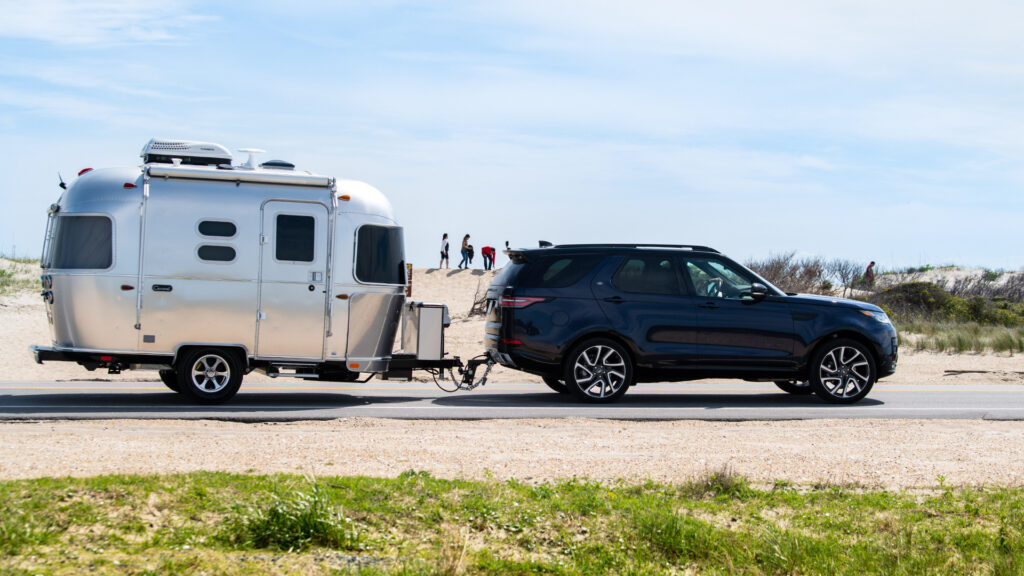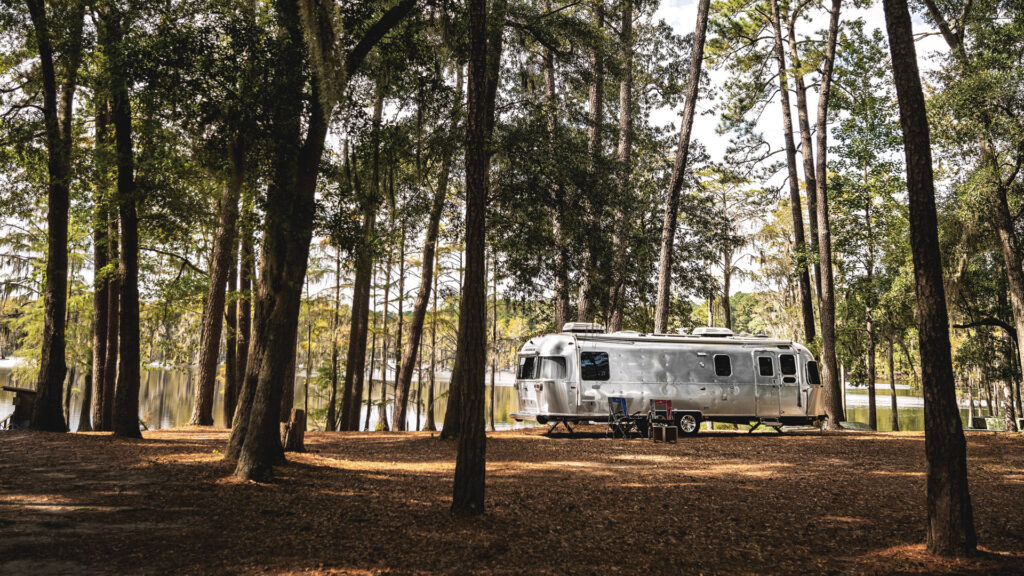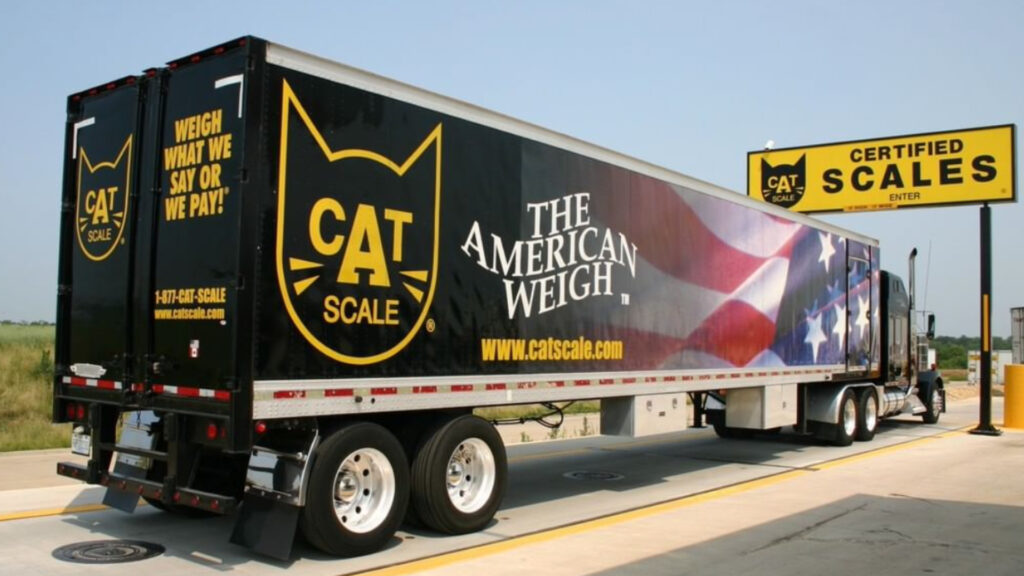Table of Contents Show
There’s nothing more iconic than the silver bullet of an Airstream. When you pass one on the highway, it’s not unusual to feel a rush of pride.
There’s just something about these travel trailers that capture the hearts of Americans. No slides, no huge front windshield, no stunning paint scheme.
Just the simple silver spacecraft on wheels built with a quality unlike any other brand in the RV industry.
But did you know that Airstreams are pretty light, especially compared to travel trailers of similar size? Not only are they top quality, but many people can tow them with an SUV or light-duty truck.
Let’s learn more about the average Airstream weight; maybe you’ll be even more convinced that an Airstream purchase is in your future!
The History of Airstream
In 1931, Wally Bynum opened the first Airstream factory in Culver City, California. Travel trailers boomed for a decade, and many manufacturers didn’t make it through World War II; only Airstream remained.
By 1952, Airstream had outgrown its facility in Culver City and moved its plant to Jackson Center, Ohio.
Airstream manufactured motorhomes and coaches through the years, but its bread-and-butter was always the iconic travel trailer line. In 1980, Thor Industries acquired Airstream, and that relationship remains today.
Since the 1990s, they introduced new models, mainly smaller and lighter units. By 2018, Airstream needed to expand again and built a new 750,000-square-foot headquarters in Jackson Center.
Airstream has been one of the most successful businesses in America, not just in the RV industry.
For almost 100 years, these silver bullets have been helping Americans make memories on the road, and many of the vintage trailers are still functioning and traveling today.
Important Camper Weight Terms
Knowing the different terms regarding weight when looking for an Airstream travel trailer or any type of RV is essential.
You’ll see these numbers printed on a sticker on the side of the entry door or the side of the camper.
The manufacturer’s website will list these critical numbers. Understanding what these numbers mean to drive safely and choosing the right tow vehicle is essential.
Hitch Weight
Hitch weight is the weight placed on the rear bumper of the tow vehicle. Sometimes this is also called tongue weight.
The hitch you buy to attach an Airstream to your tow vehicle can handle a certain amount of weight.
Your tow vehicle is rated for a certain amount of weight on its bumper, so knowing the hitch weight of an Airstream is vital to choosing the correct equipment and knowing if your tow vehicle is capable of towing a particular trailer.
Keep in Mind: Do you know your trailer’s tongue weight? Stay safe while towing by understanding what a Good Tongue Weight is!
Unit Base Weight
Also known as Unloaded Vehicle Weight (UVW), the Unit Base Weight is how much the Airstream weighs without cargo. This number is generally the shipping weight of the unit. In all honesty, this number means nothing.
You want to know how much load you can put into the unit and the max weight. You don’t need to be aware of the UVW because your Airstream will probably never be empty again.
But it’s essential to know the distinction between UVW and GVWR mentioned below.
Maximum Trailer Capacity
One of the most important numbers when figuring out your Airstream weight is the maximum trailer capacity, also known as Gross Vehicle Weight Rating (GVWR).
This capacity is the fully loaded maximum amount of weight your trailer can safely hold. Manufacturers set this number.
This amount includes all the cargo (dishes, clothes, books, toys, etc.) and anything in the tanks (waste water and fresh water).
Net Carrying Capacity
The net carrying capacity is how the manufacturer gets from the UVW to the GVWR. Also known as Cargo Carrying Capacity (CCC), this is the amount of weight you can safely load into the trailer. The Airstream weight begins with the UVW.
Once you add stuff to the unit, you’re adding to the cargo carrying capacity.
The final weight fully loaded is the GVWR. You never want to overload an RV because this can lead to frame problems, swaying, and other dangerous issues.
How Much Does an Airstream Weigh?
Let’s look at these numbers for each Airstream travel trailer line. Each line has at least two floor plans, so the digits have a range rather than one specific measurement.
If you already have a tow vehicle, these numbers will give you an idea of what Airstream weight you’ll be capable of safely towing.
Basecamp
Basecamp trailers start at $46,000, usually for off-road wanderers who want to explore America’s snow, sand, dirt, and rugged terrain. Manufacturers prewire the trailers for solar, and this line equips stainless steel front stone guards and torsion axle suspension.
There are two Basecamp models; one sleeps two people while the other sleeps four.
Hitch Weight: 410-500 pounds
Unit Base Weight: 2,650-3,400 pounds
Maximum Trailer Capacity: 3,500-4,300 pounds
Net Carrying Capacity: 850-900 pounds
Length: 16’2”-20’2”
Bambi
The smallest single-axle travel trailer, the Bambi line, has four floor plans with a dedicated sleeping space, convertible dinette space, kitchen with a 12-volt refrigerator, and restroom.
They sleep up to four people. The Bambi has 30-amp service and comes with Goodyear Endurance ST225/75R15 tires, two propane tanks, and a 23-gallon fresh water tank. MSRP starts at $59,300.
Hitch Weight: 430-540 pounds
Unit Base Weight: 3,000-4,000 pounds
Maximum Trailer Capacity: 3,500-5,000 pounds
Net Carrying Capacity: 500-1,350 pounds
Length: 16’1” – 21’11”
Caravel
The Caravel line features a dedicated sleeping space, convertible dinette/lounging areas, a kitchen with residential fixtures, and a restroom.
There are four floor plans, each with one axle and a 23-gallon fresh water tank. They all sleep up to four people. MSRP starts at $74,000.
Hitch Weight: 490-565 pounds
Unit Base Weight: 3,500-4,300 pounds
Maximum Trailer Capacity: 4,300-5,000 pounds
Net Carrying Capacity: 700-1,000 pounds
Length: 16’5” – 22’2”

Flying Cloud
The Flying Cloud line starts at $94,400 and has eight floor plans.
It is built with two axles and sleeps four to eight people. It’s the most popular and family-friendly Airstream line, with more floor plans than any other travel trailer, and one floor plan features rear bunk beds.
Its weight capacity is about the middle ground for the Airstream lines.
Hitch Weight: 500–899 pounds
Unit Base Weight: 5,000-6,804 pounds
Maximum Trailer Capacity: 6,000-8,800 pounds
Net Carrying Capacity: 1,000-2,283 pounds
Length: 23’9”-30’11”

International
The International line has six floor plans that are open and airy, just like the outdoors.
Each unit has two axles and sleeps four to six people. The line defines this model by its cool wood tones; clean, modern lines; and natural seashore textures. MSRP starts at $109,100.
Hitch Weight: 500-898 pounds
Unit Base Weight: 5,000-6,517 pounds
Maximum Trailer Capacity: 6,000-8,800 pounds
Net Carrying Capacity: 1,000-2,283 pounds
Length: 23’9”-30’11”
Globetrotter
Known for its style and modern design, the Globetrotter line draws influences from Europe.
The three floor plans provide owners options for a queen or two twin beds.
High-end stainless steel appliances make the kitchen feel like home. These units sleep up to six people and have two axles. MSRP starts at $126,900.
Hitch Weight: 875-975 pounds
Unit Base Weight: 6,100-6,990 pounds
Maximum Trailer Capacity: 7,300-8,800 pounds
Net Carrying Capacity: 1,200-1,810 pounds
Length: 25’11” – 30’11”
Classic
The Classic line starts at $188,100 and is the most expensive of the travel trailers and the longest and heaviest Airstream weight.
This flagship travel trailer is for full-time living or longer road trips.
Owners can enjoy dedicated cooking, dining, lounging, bathroom, and bedroom spaces. Two floor plans are available; both have two axles and sleep up to five people.
Hitch Weight: 850-1,000 pounds
Unit Base Weight: 7,900-8,375 pounds
Maximum Trailer Capacity: 10,000 pounds
Net Carrying Capacity: 1,625-2,100 pounds
Length: 31’5”-33’3”

Are Airstreams Lighter Than Other Travel Trailers?
The Airstream’s weight varies from unit to unit, just like any other travel trailer.
For example, the Coachmen Freedom Express Liberty Edition travel trailer line has five floor plans ranging from 33’4” to 37’1” and a GVWR of 9,500 to 10,500 pounds.
Airstream offers units with a wide range of lengths and weights so that owners of any type of tow vehicle can find an Airstream their car is capable of towing safely.
The smallest unit, the Bambi, has a length of about 16 feet, while the largest unit, the Classic, goes beyond 33 feet. The lightest unit is 3,000 pounds, while the heaviest unit is 10,000 pounds.
Most travel trailer manufacturers don’t have such an extensive range of options.
Keep in Mind: Airstreams are expensive! But you may be able to find some Used Airstreams for Sale That Aren’t a Scam!
Why Is My Airstream Weight Important to Know?
No matter what travel trailer you have, it’s essential to understand the weights. The hitch weight, GVWR, and CCC are necessary to ensure you are safely towing and not putting undue stress on the trailer or the tow vehicle.
If you exceed the towing capacity of your tow vehicle, you’re risking damage to your vehicle’s brake system, transmission system, engine, and more.
It can only handle a certain load amount. So knowing the GVWR of your Airstream is vital to maintaining the overall condition of your tow vehicle.
If you overload the Airstream and exceed the CCC, you risk damaging the trailer. You’ve possibly spent over a hundred thousand dollars on your travel trailer.
You don’t want to damage it or pay for extensive repairs because you didn’t know how much your travel trailer weighed or how much cargo you were putting in it.
How Do I Know My Airstream Weight When Loaded?
Once you’ve loaded up your Airstream, head to a truck stop with a CAT scale. These scales weigh semi-trucks and other large vehicles. You drive across the scales and wait.
If you have the app, you can immediately receive the Airstream weight plus your car’s. If you don’t have the app, you can go inside to receive a paper copy of this information.
Then drop your trailer and weigh your tow vehicle by itself. Subtract this number from the combined number to know how much your travel trailer weighs.
Make sure you’re always within the limits set by the manufacturer. Your Airstream weight should be below the GVWR and your vehicle’s towing capacity.

Stay Under 10,000 Pounds With an Airstream Trailer
You can stay under 10,000 pounds with all of the Airstream travel trailers.
Plus, the cargo carrying capacities can be pretty significant, with some Classic, International, and Flying Cloud units holding over 2,000 pounds of stuff.
When traveling full-time or taking long road trips, this number is essential because you’ll need to transport more things than if you were just making short, weekend trips.
So no matter what tow vehicle you own, an Airstream weight fits your towing capacity and hitch weight.
From the tiny Bambi to the large Classic and all the varying lengths and weights, you’ll find a floor plan that suits your needs and a unit you can tow safely and comfortably.
Which Airstream model best fits your travel lifestyle?






